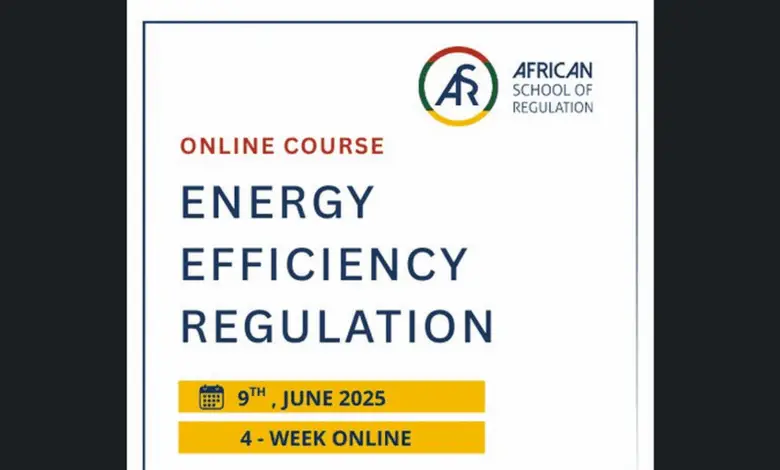New Online Course Launch: Enroll for the Energy Efficiency Regulation Course at the African School of Regulation

Closing Date: 2 June 2025
New Online Course Launch: Enroll for the Energy Efficiency Regulation Course at the African School of Regulation
4-Week New Online Course Overview
Energy efficiency plays a crucial role in achieving sustainable energy systems, reducing operational costs, and mitigating environmental impacts. Effective energy efficiency regulation ensures the optimization of energy use, reducing waste while fostering economic growth. To build the capacity of professionals in energy regulation, the African School of Regulation (ASR) is offering a comprehensive four weeks, one day a week training program on Energy Efficiency Regulation. This new online course is designed to equip participants with the necessary skills and knowledge to design, implement, and enforce energy efficiency policies and regulations.
Course Objectives
The Energy Efficiency Regulation course aims to:
- Provide a deep understanding of energy efficiency principles and their role in sustainable development.
- Present regulatory frameworks and policies for industrial, commercial, and institutional energy efficiency.
- Train participants on energy performance standards (MEPS) and compliance mechanisms.
- Showcase global best practices and case studies in energy efficiency regulation.
- Equip participants with economic simulation modelling techniques to assess the financial justification for regulatory interventions.
Expected Outcomes
By the end of the Energy Efficiency Regulation course, participants will:
- Gain a comprehensive understanding of energy efficiency regulatory frameworks.
- Be equipped with the tools to design and implement energy efficiency policies.
- Develop skills to assess and improve MEPS and compliance mechanisms.
- Understand economic modelling techniques to justify regulatory interventions.
- Be able to apply global best practices in their respective institutions.

Course Structure
The training will be structured across four weeks, one day per week, covering the following topics:
Week One: Regulating Energy Efficiency – A Background
- Introduction to energy systems (generation, distribution, and consumption)
- The link between energy consumption and externalities (environmental and financial impacts)
- Principles of energy efficiency and conservation
- Transmission and distribution losses
- Role of policies in implementing energy efficiency (command and control, market-based policies)
Week Two: Industrial, Institutional, and Commercial Energy Efficiency Regulation
- Energy Management Systems (audits, corporate policies, measurement, and verification)
- Mandatory compliance thresholds and regulatory frameworks
- Quality control in energy auditing (licensing of auditors and audit firms)
- Role of Energy Service Companies (ESCOs)
- Stakeholder management in energy efficiency regulation
Week Three: Energy Performance Standards (MEPS)
- Introduction to Minimum Energy Performance Standards (MEPS) and benchmarks
- Implementation of standards and labeling for appliances, buildings, and vehicles
- Measuring success and improving MEPS (data management and modeling)
Week Four: Case Studies and Practical Applications
- Best practices in industrial, commercial, and institutional energy efficiency regulations worldwide
- Case studies of successful energy performance standards implementation
- Economic simulation modelling exercises for regulatory interventions
Course Delivery and Learning Methodology
The course will be delivered through Brightspace LMS and will include:
- Practical exercises and assessments to evaluate learning outcomes
- Pre-recorded video lectures for self-paced learning
- Live interactive sessions with expert instructors
- Case study discussions to provide real-world insights
- Q&A session and office hour for personalized learning
Target Audience
This course is designed for:
- International development agencies and NGOs involved in energy policy
- Energy Regulators and policymakers
- Government officials responsible for energy policy and sustainability
- Utility companies and energy service providers
- Energy managers and auditors
- Industrial and commercial facility operators
- Academics and researchers in the field of energy regulation
Students’ enrolment:
*Please send your certificate of current studies with the stamp of your university to ASR Course Support: [email protected].
Your studies’ start and end dates should also be clearly mentioned in the document. Please make sure that your period of studies fully covers the duration of the training course.
Click Here To Apply
Follow Opportunities For Everyone on Social Media




